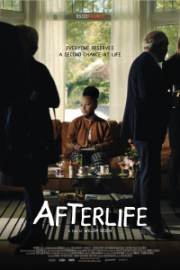Afterlife
Willem Bosch’s “Afterlife,” like many other films before it, asks similar question about life and death that we’ve seen plenty of other filmmakers tackle before. I don’t recall one that’s done it quite like Bosch does here, though, as he brings reincarnation, predestination and questions of faith to the topic in an entertaining, emotional way that showed a special voice at work.
Sam (the wonderful Sanaa Giwa) is a young girl when her mother, Vera (a heartbreaking Romana Vrede), dies tragically. A little over a year later, Sam dies, as well, leaving behind her father (Gijs Scholten van Aschat) and two young brothers. In the Afterlife, she is met by Martin (Jan-Paul Buijs), whom is something of a guardian angel, before she has a choice to make whether to be reincarnated, or to stay. She stays, and is reunited with her mother, and her family, but a friend, Joke (Ria Eimers), tries to convince Vera that maybe, Sam shouldn’t be here yet. Another chance exists for her to go back. And for Sam, maybe a chance to save her mother, as well.
There’s a lot to unpack about the film’s view of mortality and spirituality and even immortality. One thing I have to say was one of my favorite parts of the film was how it visualized the Afterlife. Of course, Bosch was probably limited by budgetary concerns, but he also created an intriguing vision of the Afterlife as an extension on Earth. No clouds and angels with halos. No pearly gates. Remember the world DiCaprio and his wife built for themselves in “Inception?” That was the first thing I immediately thought of, and I thought it was such a smart choice. The “angels” like Martin aren’t otherworldly brings but more workers whom are supposed to spend as little time with the mortals they come in contact with as possible. But, Martin is as important an observer to the story as the angels in “Wings of Desire” are there, because there is knowledge about the lives of the characters that they possess, but the characters do not. I even wonder if one of the main characters themselves is one of these “angels.”
This is a beautiful film about family, mothers and daughters, and how life works, or doesn’t, sometimes. Sam makes a choice to go back to her old life, at one point, but it’s not just a matter of resuming at the same moment it ended. When she returns, she is singing a mantra for herself to remember, but along the way, it gets twisted. Her life continues to be forever informed by it, however. She was very much into painting and art before her mother died, and she returns to that in a very specific way to what she is trying to remember. As she grows older, she forgets, but that reminder is always there with us, like a ticking clock, waiting for it to land with her. When we start to see the pieces fall into place, it’s painful as things start to unfold. It’s a credit to Bosch, his story, and his actors, that the film ends not is pain but in possibility for the future. This film’s heart isn’t about suffering from loss, but accepting it, finding love in life, and finding a way to move on.










